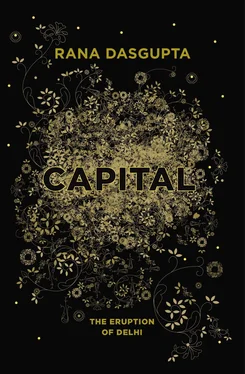This is why spiritual advisers were as prominent in the business world as accountants and lawyers. Having acquired their wealth by hacking the political machine, rich people sought to ensure they did not lose it by employing the services of those who could hack the cosmic machine. Gurus told businesspeople what to do to keep the universal flows pointing in their direction: eat these foods, drive a car of this colour, choose a phone number ending in this digit, marry a woman with this name, wear a ring with this stone. There were gurus who specialised in property, gurus who were experts at legal disputes, and gurus who helped with focus and energy. A business class that, despite all the signs to the contrary, suffered from deep fears about its own downfall, turned to gurus to help it preserve itself. Gurus exorcised this class of its many ghosts: they sought to extract from the equation of Indian business the great accumulation of negativity that they felt.
But it was possible to glimpse something else in Delhi businessmen, something more paradoxical than the simple desperation to hang onto what they had. It was possible to see that their urge to acquire and accumulate sat alongside another, precisely opposite, impulse: to rid themselves of everything, to be pure, ascetic and uncorrupted. In this they had more in common, in fact, with European capitalists of the Renaissance era than with their contemporary Western counterparts. The consumer universe offered many kinds of ‘choice’ but it did not allow rich people to choose nothing — and yet this desire to possess nothing is actually much more powerful in human history than we consumerists commonly remember. In this part of the world, particularly, the urge to give up the material life and wander in search of something else was significant, as was the relationship entertained by the powerful and moneyed with the spiritual and poor. The way that contemporary business warriors registered their success was through the accumulation of money and possessions, but this in some ways dulled the entire enterprise. For warriors have always prized asceticism: the spiritual economy that allows practitioners to rise above the common condition and achieve truly noble feats. Sometimes the ascetic drive was felt powerfully by these men — particularly the men — whose Hinduism constantly warned them of spiritual corruption. Delhi’s businessmen turned to gurus not only to help them keep their wealth, therefore, but to help them endure it.
• • •
“In 1999, my life changed. I began an affair with a pretty married woman with two kids. She was separated from her husband and I really liked her. And it was in that year that I began trading.
“I went into business with a man who was India’s largest wheat exporter. We began trading a lot of different commodities and the returns were so amazing that everyone was putting money into our business. The richest Indians from all over the world put money in: they would give us a crore and six weeks later we gave them 3 crores back. We were getting capital from everyone and everywhere we could. I liquidated property and investments to put money in; all my friends were doing the same.
“You see: liberalisation was a gradual process, and as late as 1999 trade restrictions were still being lifted on imports. My partner and I knew people in the government, so we had inside information about which restrictions would be lifted next. It was just like all the real estate guys who got inside information about where the new highways were being planned, and then bought land there. We bought up stocks of a commodity before anyone else knew it would be derestricted. We had shiploads ready to come into the country as soon as the restrictions were lifted, and we made a pile of money very quickly. Then the big companies would start to import that commodity and we moved onto something else. We made so much money, it was embarrassing.
“Then it all ended. Because we have something in India called jealousy. My business partner had another business partner who reported us to the police, and straight away every investigative agency in the country was up our ass. Asking how we had made so much money so quickly. We also had huge quantities of black money because we had to give out bribes. A shipload of wheat was worth 40 crores [$8 million] and to get it through you would have to hand out bribes of 50 lakhs [$100,000]. So they were suspicious.
“After that all my bank accounts were frozen and my money was inaccessible. I had 500 crores [$100 million] sitting in the bank but I couldn’t touch it. So I didn’t make anything during the boom while everyone else was putting money in real estate. There were four years of questions. I became very frustrated — I’d worked to earn the money but couldn’t enjoy the fruits of my work.
“At the same time my girlfriend left me and began an affair with one of Delhi’s most insane men, the son of a cabinet minister. She knew he was very violent but she also knew he was about to become very rich because her brother was in on the same deal. So she went to be with him.”
Now thirty-four years old, Puneet has not worked for more than a decade. He stays at home, mostly, since his friends are all rich and he has no income. Today, in anticipation of my visit, he has put on a shirt, newly pressed trousers and a pair of leather brogues. We sit together in the spacious living room whose walls are hung with hunting scenes and antique engravings of Indian cities as they appeared to English nineteenth-century travellers.
Puneet’s improbable windfall was helped along by the fact that he went to one of Delhi’s most prestigious schools, the preferred choice of the political and business elite. His school friends were the sons and daughters of the most powerful people in the country, and they revelled in their shared invulnerability. The school provided, essentially, an apprenticeship in power-mongering.
“There was this guy who married into an army family, which enabled him to become a successful arms dealer. His two sons were at school with me. One day we were at the nightclub at the Hyatt and the sons got into a big fight. The bouncers started fighting them and they called their dad. He rushed over there — he’s a huge guy himself — and he beat up the bouncers. He picked up big plant pots and threw them at them. Then he got his sons out. After that he planted a fake picture of his sons bandaged up in hospital in the newspapers to get sympathy for them, and filed a lawsuit against the Hyatt.
“That kind of stuff happened all the time. Whenever trouble broke out, boys would be competing with each other over which of their fathers had more power to intervene: ‘ I’ll call my dad. No, I’ll call my dad. ’
“One guy was the son of the minister of external affairs. So his father had control over passports. One day my friend gets off a flight into India and he turns up at the immigration desk. His passport was folded in two in his back pocket. He put it on the desk. The immigration guy said, ‘You can’t treat your passport like that. You’re defacing government property.’ My friend replied, ‘You want to see how I treat my passport?’ and he started ripping pages out of his passport and tossing them one by one in the face of the guy behind the desk.
“Another friend wanted to get a driving license. When you’re eighteen, everyone is trying to get a driving license. So he walked into the transport authority. He started dropping the name of his uncle, who was the chief of police. As he went around the office, he moved from the lowest rung to the highest rung until he met the guy in charge, who organised for him to have his full license there and then. This was an incredible feat. Usually you have a provisional license first and a full license is only granted later, and at age eighteen a full driving license is the coolest thing you can get. But while this was going on, someone made a call to the police chief’s office, found out the guy was bullshitting about who his uncle was and cut up the license in front of him.
Читать дальше











